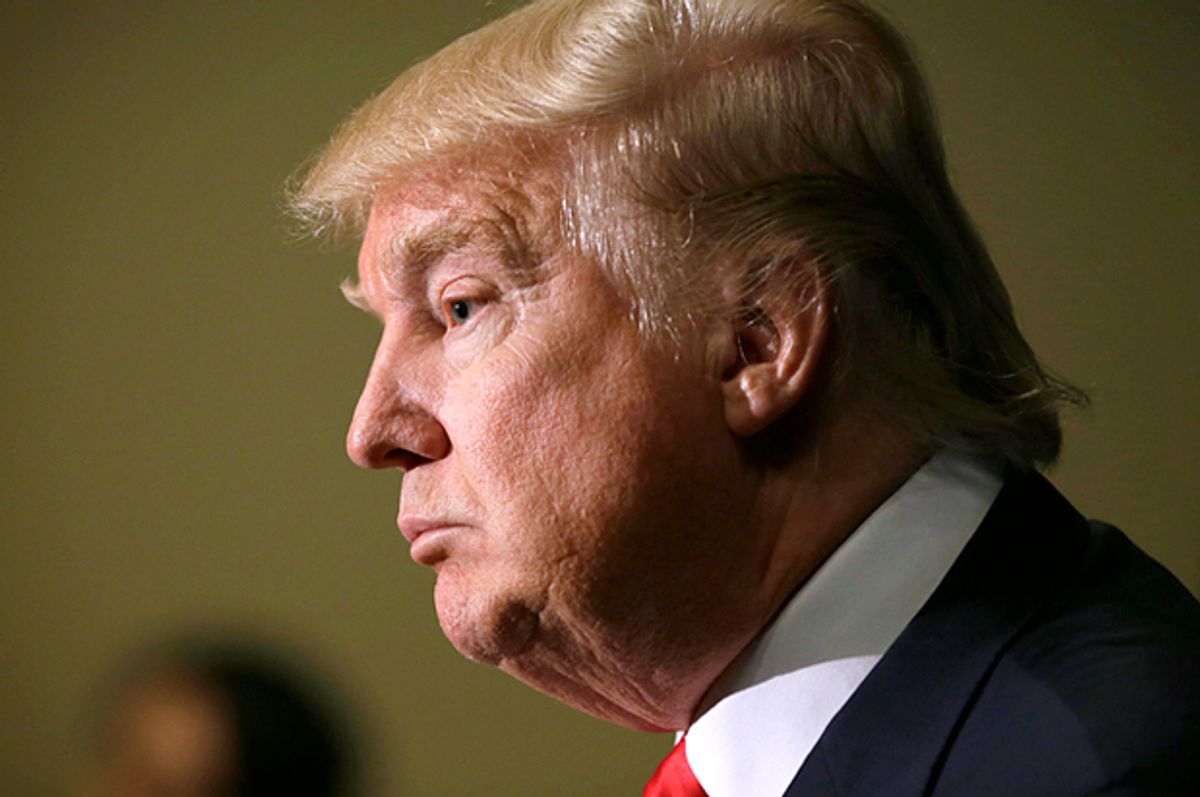Now that we’re nearly at the end of the Summer of Trump, you could be forgiven for feeling like you and “The Donald” need a break.
But before you really devote yourself to purging this cherisher of women from your mind, do yourself a favor and read Evan Osnos’s recent New Yorker piece on the “loose alliance” of scared and angry Americans who are driving the Trump phenomenon. As Osnos understands, Trump’s supporters, who are part of a nativist resurgence throughout Western politics, are more important than the man himself. And regardless of Trump 2016’s ultimate fate, these people aren’t going anywhere.
I’ve written previously about the Trumpites (or Trumpeteers, if you prefer) and how they’re defined as much by their authoritarianism as their ethno-nationalism. But while those characteristics are certainly present among the people Osnos spoke to for his report, another trait jumps out, too. And it’s one that helps explain why the Republican Party establishment is so out of touch, and so incapable of defeating Trump in a zero-sum battle for influence.
The trait is a lack of belief. Not in God or country, both of which Trump supporters rather enjoy, but rather in the fundamental legitimacy of American society’s most powerful and entrenched institutions; the government, the banks, the media, the academy, etc. Because aside from one extremely notable exception (which we’ll talk about in a bit), there’s not a single major institution of American political life that these folks wouldn’t like to see Trump conquer — the Republican Party itself very much included.
For a sense of how this plays out in the real world, think of the now-infamous opening question of the GOP’s first top-tier presidential debate. In truth, the question was more of an order: Any candidate who would not promise to support the GOP in 2016, regardless of the candidate, was asked to raise their hand. The request was ostensibly directed toward all of the debate participants, but everyone knew its real target was the only candidate who hadn’t ruled out a third-party run: Trump.
The question was an attempt to bring Trump to heel by leveraging the Republican Party’s institutional prestige against him. The goal was simple: expose Trump as a bad team-player. And if we lived in a time when party loyalty mattered, it probably would’ve worked. But the devoted reactionaries who now comprise the GOP base don’t trust — much less like — the “RINOs” among them. The patent anti-Trump bias of the Fox News/Republican Party borg only made them love him more.
That’s certainly the impression you get reading Osnos’s piece, or this Time report on a recent focus group run by Frank Luntz. One woman tells Luntz that she is “frustrated beyond belief.” She says she feels like she’s been “lied to,” because despite Republican gains in the 2014 midterms, “[n]othing’s getting better.” Her sentiment was widely and deeply shared. “We’ve got to show the Republicans that we’ve had it with them,” another woman said. “They treat us like crap,” she added. “That’s why we want Trump.”
It’s hard to imagine there’s anything the Republican Party can do in this climate to win the favor of Trump’s supporters. But state Republican Party efforts in North Carolina, South Carolina, and Virginia to “compel” Trump to swear loyalty to the GOP are especially doomed. Such an ultimatum is not only “[t]he kind of thing that could make [Trump] bolt the GOP,” as ex-Trump advisor Roger Stone tweeted. It’s the kind of thing that could make Trump supporters in those states vote for a third-party. Or simply not vote.
So the GOP is in quite a bind. If it goes after Trump, it will only bring him and his supporters closer together. But if the Republican Party tries to ignore him, or allow him to transform it into an American version of UKIP, then it will no longer be able to serve its fundamental purpose of winning elective office for Republican candidates — especially the ones aiming for the White House. And if you’re looking at this from the perspective of the GOP as an institution, that’s unacceptable.
For conservatives trying to win the Trumpites back to the GOP, it seems, the Holy Grail would align the party with an institution that has even more gravitas and authority than Donald Trump. And as I said earlier, polling suggests there is at least one institution that fits the bill. Using it as a wedge to separate Trump from his admirers, however, would raise some major ethical questions. For example, what if the cure for Trumpism is somehow even worse?
Because the institution in question is the military — which Americans trust far more than the media, organized religion, and the rest of the government — that’s a real concern. It was when he spoke of the armed forces that Luntz’s focus group adored Trump the most. “[T]he military is going to be so strong,” he promised, “nobody is going to mess around with the United States.” He got nearly unanimous 100s for that boast, apparently; “a seldom occurrence among focus groups,” according to Time.
Perhaps the world should be thankful, then, that there is no war hero or celebrity general for the GOP to task with destroying Trump. (Thanks, Paula!) But if we assume that Trump is succeeding mainly because he reaches voters who felt otherwise ignored, and not because of any extraordinary political talents, then there’s no reason to think the problem Trump represents will go away once he does. It could just as easily come back again and again and again, each time in a slightly different form.
And if the GOP eventually does find a military figure who is acceptable to the establishment while simultaneously bringing the Trumpites back into the party tent? Well, then there may be a time in the not-so-distant future when we’ll pine for the relatively benign and innocent days of the Summer of Trump.

Shares